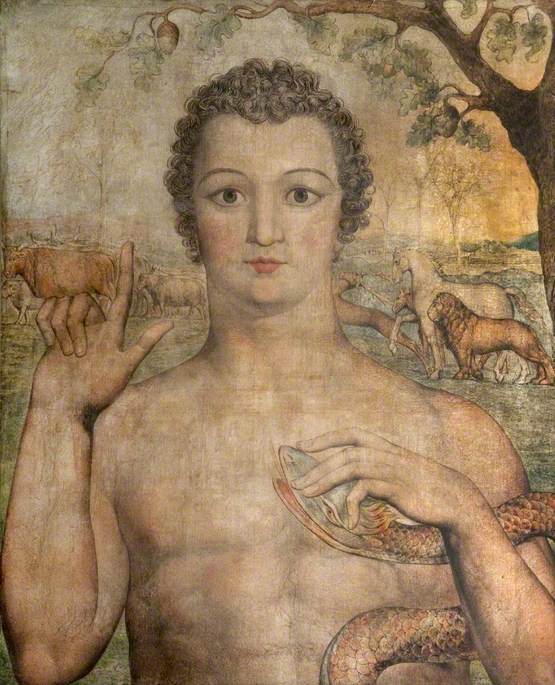To fully appreciate the impact of the four paintings which Blake painted for Thomas Butts in 1810 we would need to be in Butts' home and see them hanging together on a wall. Although many of Blake's pictures are small, these are large with dimensions of approximately 30 inches by 25 inches . They were executed in a tempera technique on fine linen. Blake inscribed them with the date, his name and the word 'Fresco', his term for tempera. The paintings now reside in three museums, the Adam and Eve images in the Glasgow Museum, the Virgin and Child in the Victoria & Albert Museum, and the Christ image in the Fogg Museum at Harvard.
The four images are shown together here to compare and contrast. The unifying style signifies that the group is to be interpreted as a whole. The details of the focus of the eyes, the positions of the hands, the representative trees, and the backgrounds distinguish characteristics of each stage of development.
The four images are shown together here to compare and contrast. The unifying style signifies that the group is to be interpreted as a whole. The details of the focus of the eyes, the positions of the hands, the representative trees, and the backgrounds distinguish characteristics of each stage of development.
 |
| Eve Naming Birds |
 |
| Adam Naming Beasts |
| Harvard Art Museums Fogg Museum Christ Blessing |
 | |
| Virgin and Child in Egypt |
Advertisement of Exhibition, (E 527)
"Fresco Painting, as it is now practised, is like
most other things, the contrary of what it pretends to be.
The execution of my Designs, being all in Water-colours,
(that is in Fresco) are regularly refused to be exhibited by the
Royal Academy, and the British Institution has,
this year, followed its example, and has effectually excluded me
by this Resolution; I therefore invite those Noblemen and
Gentlem[e]n, who are its Subscribers, to inspect what they have
excluded: and those who have been told that my Works are
but an unscientific and irregular Eccentricity, a Madman's
Scrawls, I demand of them to do me the justice to examine before
they decide.
There cannot be more than two or three great Painters or
Poets in any Age or Country; and these, in a corrupt state of
Society, are easily excluded, but not so easily obstructed. They
have ex[c]luded Watercolours; it is therefore become necessary
that I should exhibit to the Public, in an Exhibition of my own,
my Designs, Painted in Watercolours. If Italy is enriched and
made great by RAPHAEL, if MICHAEL ANGELO is its supreme glory, if
Art is the glory of a Nation, if Genius and Inspiration are the
great Origin and Bond of Society, the distinction my Works have
obtained from those who best understand such things, calls for my
Exhibition as the greatest of Duties to my Country.
WILLIAM BLAKE"
Descriptive Catalogue, (E 531)
"All Frescos are as high finished as miniatures or enamels,
and they are known to be unchangeable; but oil being a body
itself, will drink or absorb very little colour, and changing
yellow, and at length brown, destroys every colour it is mixed
with, especially every delicate colour. It turns every permanent
white to a yellow and brown putty, and has compelled the use of
that destroyer of colour, white lead; which, when its protecting
oil is evaporated, will become lead again. This is an awful
things to say to oil Painters; they may call it madness, but it
is true. All the genuine old little Pictures, called Cabinet
Pictures, are in fresco and not in oil, Oil was not used except
by blundering ignorance, till after Vandyke's time, but the art
of fresco painting [P 7] being lost, oil became a fetter to
genius, and a dungeon to art. But one convincing proof among
many others, that these assertions are true is, that real gold
and silver cannot be used with oil, as they are in all the old
pictures and in Mr. B.'s frescos."





